The recent FA Cup weekend fixtures played host to plenty of drama, but Burnley’s defeat to English champions Manchester City was almost a foregone conclusion. The Clarets drove down the M66 with hopes of advancing to the fifth round, but Pep Guardiola’s boys were too robust. City were 1-0 up at halftime but ran out 5-0 winners, the same final score from when City hosted Burnley in October. In truth, the match was over by the second or third goal. There are still many talking points to be had, and we’ll cover the most important in this tactical analysis.
Tactical preface
Manchester City are currently chasing Liverpool atop the Premier League and looking forward to a deep Champions League run. This stress would weigh heavily on many sides, but thus far Guardiola and his team have dealt with it appropriately. Sean Dyche’s Burnley are certainly no pushovers, but the Spaniard was able to rest a few of his star players, such as Sergio Agüero and David Silva.
Nicolás Otamendi and John Stones were paired together in defence, as full-backs Kyle Walker and Danilo provided width and strength in possession. The latter was particularly involved in City’s midfield buildup, while Walker used his trademark bombarding runs to stretch out Burnley’s back five.
In midfield, Fernandinho was proficient in both cutting out scoring chances and creating them himself. While Kevin De Bruyne often dropped deep in the right half-space, Ilkay Gündogan was given free reign to attack Burnley’s back line. Riyad Mahrez hugged the left flank, giving Gündogan room to operate, while Bernardo Silva was ever-present in and around the box. Gabriel Jesus made good on his chances, finding space in behind Burnley’s defence multiple times.
Dyche did not put out his strongest XI, but it’s hard to blame him. Burnley are a mere three points clear of relegation, so the FA Cup is not his main priority. Strike duo Chris Wood and Ashley Barnes were so crucial in Burnley’s win over West Ham in December, but they made way for an extra defender and sole striker Matej Vydra.
Goalkeeper Nick Pope was chosen ahead of Joe Hart and Tom Heaton and had a good match despite the final score. Burnley’s traditionally solid defence was too easily split open on Saturday, with James Tarkowski unable to inspire his backline to the task. Dwight McNeil’s tricky wing play was a talking point coming into the match, but City’s exceptional defence managed to stifle Burnley’s creative wide man.
Manchester City advance through possession
For a side such as Burnley, one that restrains space in the box but lets its opponent control the game outside it, ceding three-quarters of the game’s possession is a part of the plan. This is especially true against a remarkable side such as Manchester City equipped with the likes of De Bruyne, Bernardo, and Gündogan. However, City’s possession wasn’t just passing around the back. They were proactive, efficient, and effective.
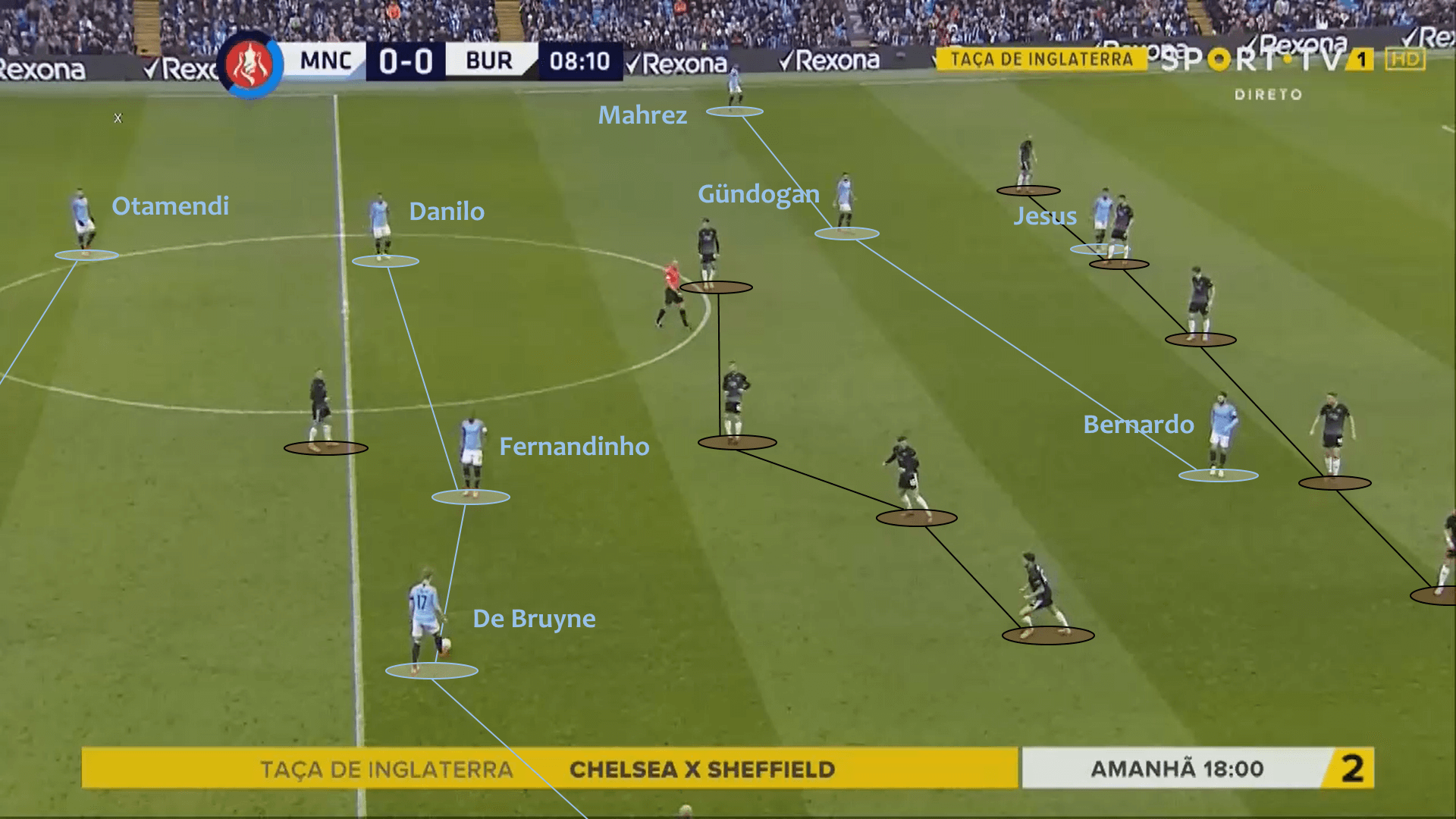
Sean Dyche’s main goal in forming Burnley so defensively was, obviously, to restrict the amount of touches Jesus, Mahrez, and other City attackers could have close to goal. They were somewhat effective in the sense that the Blues failed to drive directly down the heart of Burnley’s team, but City were not aiming to do so. Instead, it was quick lateral movements that blew open Dyche’s game plan and, with it, the score.
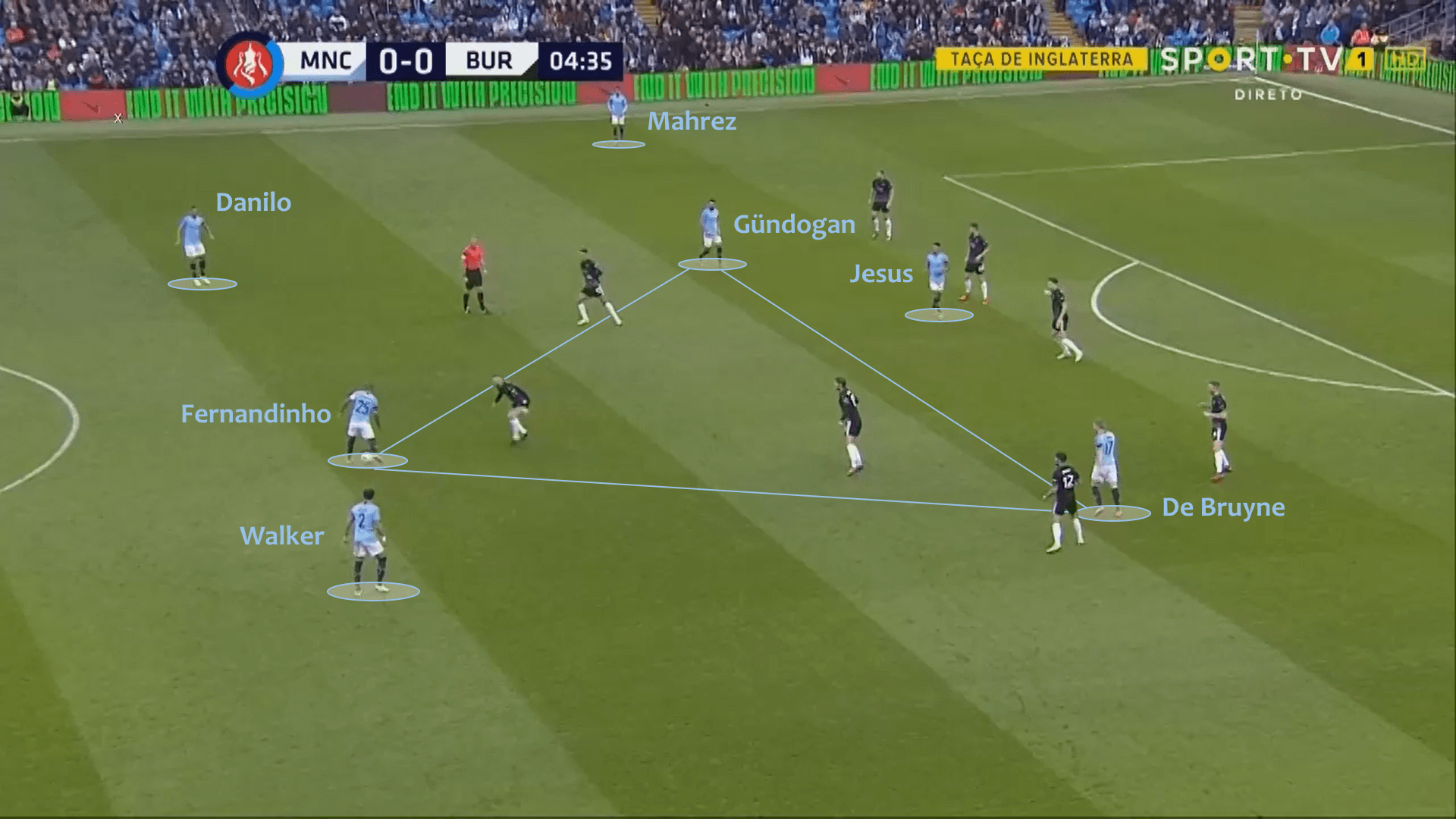
In the shot above, we see how City transferred from a base 2-4-3-1 to more of a 2-3-5. Walker and Danilo are tucked in with Fernandinho, while Gündogan and De Bruyne have moved further up, between Burnley’s midfield and defence. Burnley’s four midfielders deny all passing opportunities to the central attackers, but Manchester City’s number six realizes this. Fernandinho switches the ball to the left, which sets off a chain reaction that Pep planned from the beginning.
The ball eventually makes its way to Gündogan, who is very high up the pitch. Burnley immediately stick two players on him, forcing the German to cede the ball to the wider Mahrez. Wide player McNeil is the man to pick up Mahrez, drawing him out from his more central defensive position. City have a man disadvantage on the wing, but an advantage somewhere else.
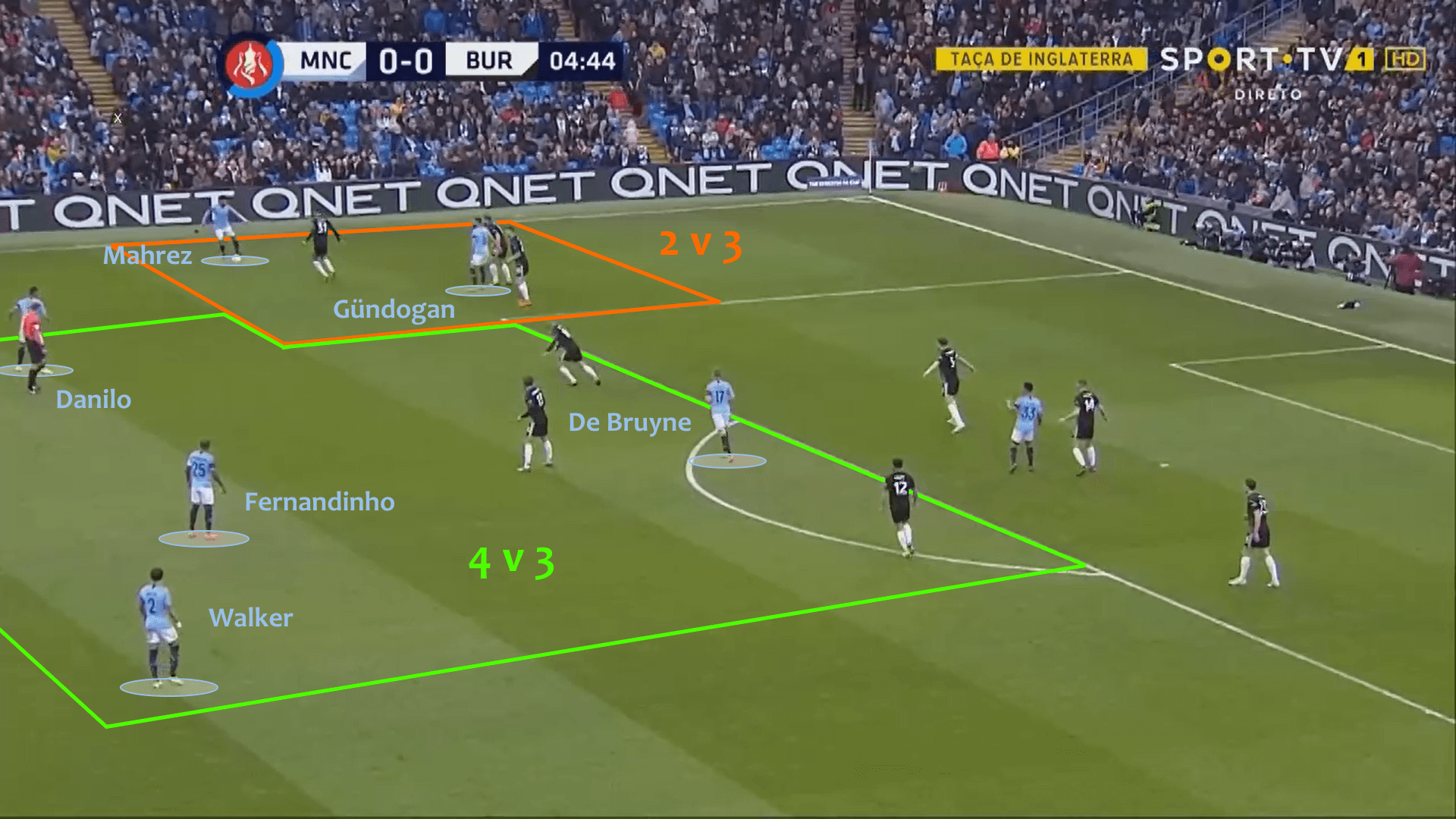
Burnley have a five-man defence, so that advantage is not in the box. Instead, City are given a 4v3 opportunity just outside it. With a switch back to Danilo, City are suddenly in the driver’s seat and have passing opportunities close to goal. Even though Burnley were able to avoid central infiltration, City were smart enough to work the ball closer to goal via the flanks.
Burnley’s structure fails to hold
City’s first half goal came from a ball in behind to Jesus, who made a magnificent run to score past Pope. It was not how City created the majority of their chances, but the Brazilian striker was one of City’s most efficient attackers on the day. His ability to sniff out a pass behind the lines completely exhausted Burnley’s defensive plan.
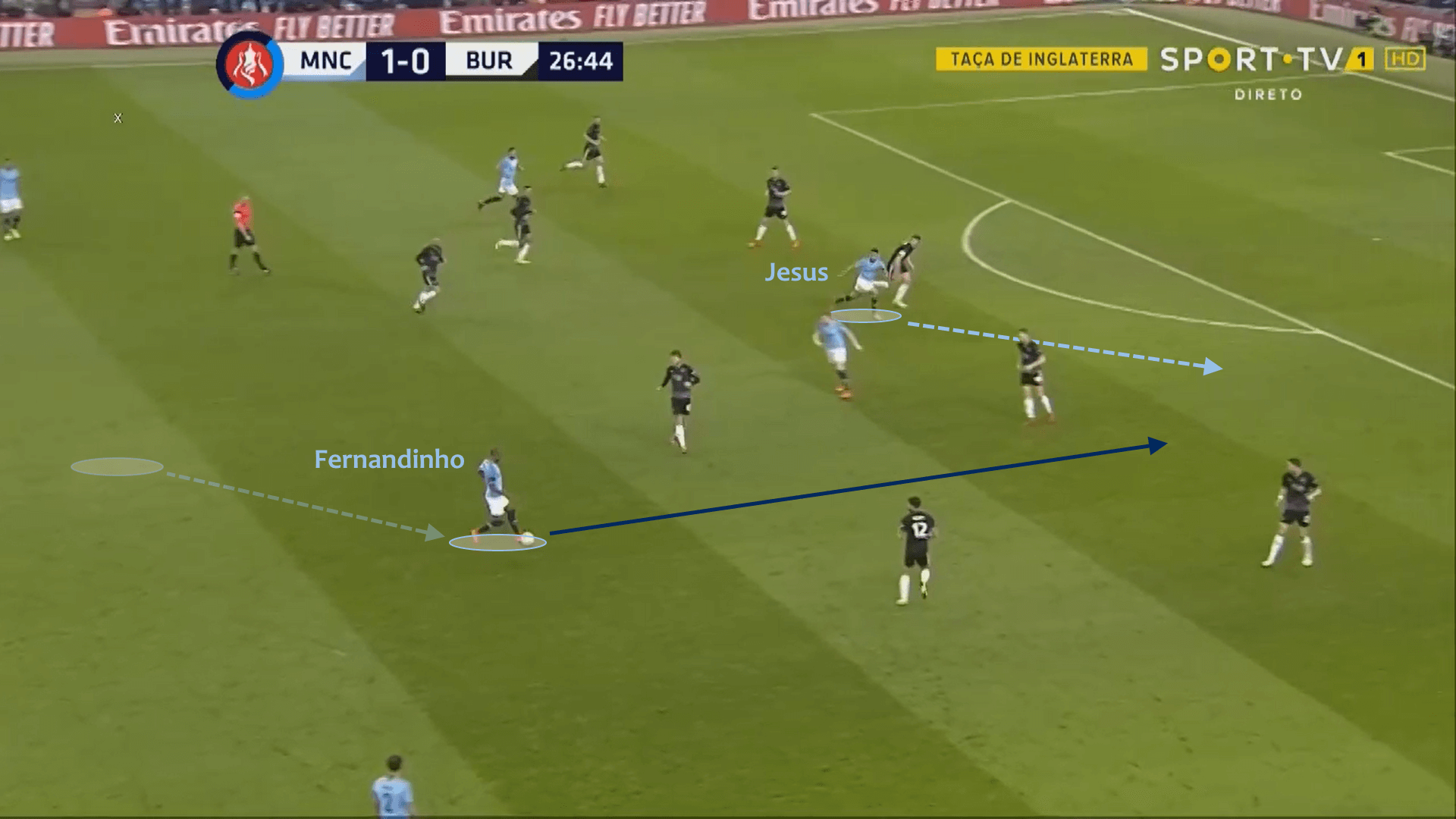
City usually pick out these line-splitting passes after spells of possession or if the opposition is putting a lot of pressure on the defence. Burnley were not doing the latter, so the likes of Fernandinho and Danilo were able to find space to curl passes past one or two lines. Fernandinho picked out a brilliant pass to Jesus in the first half, as his positioning closer to the right flank gave him the vision to find his compatriot. The striker’s angled run was spectacular; his speed and reactions saw two Burnley lines split in the blink of an eye.
Burnley were uncannily not able to deal with these types of passes. You’d think the five-man defence would be able to prevent chances like these, but Guardiola has built one of the best attacking sides in the world. No amount of tactical preparation can stop City from getting chances at goal.
However, there were some things that Dyche’s players failed to realise. The plan to move wide players McNeil and Robbie Brady back to cover their defence was a smart one, but the implementation was poor. Too much space was given to players like Danilo and De Bruyne to send in passes or crosses.
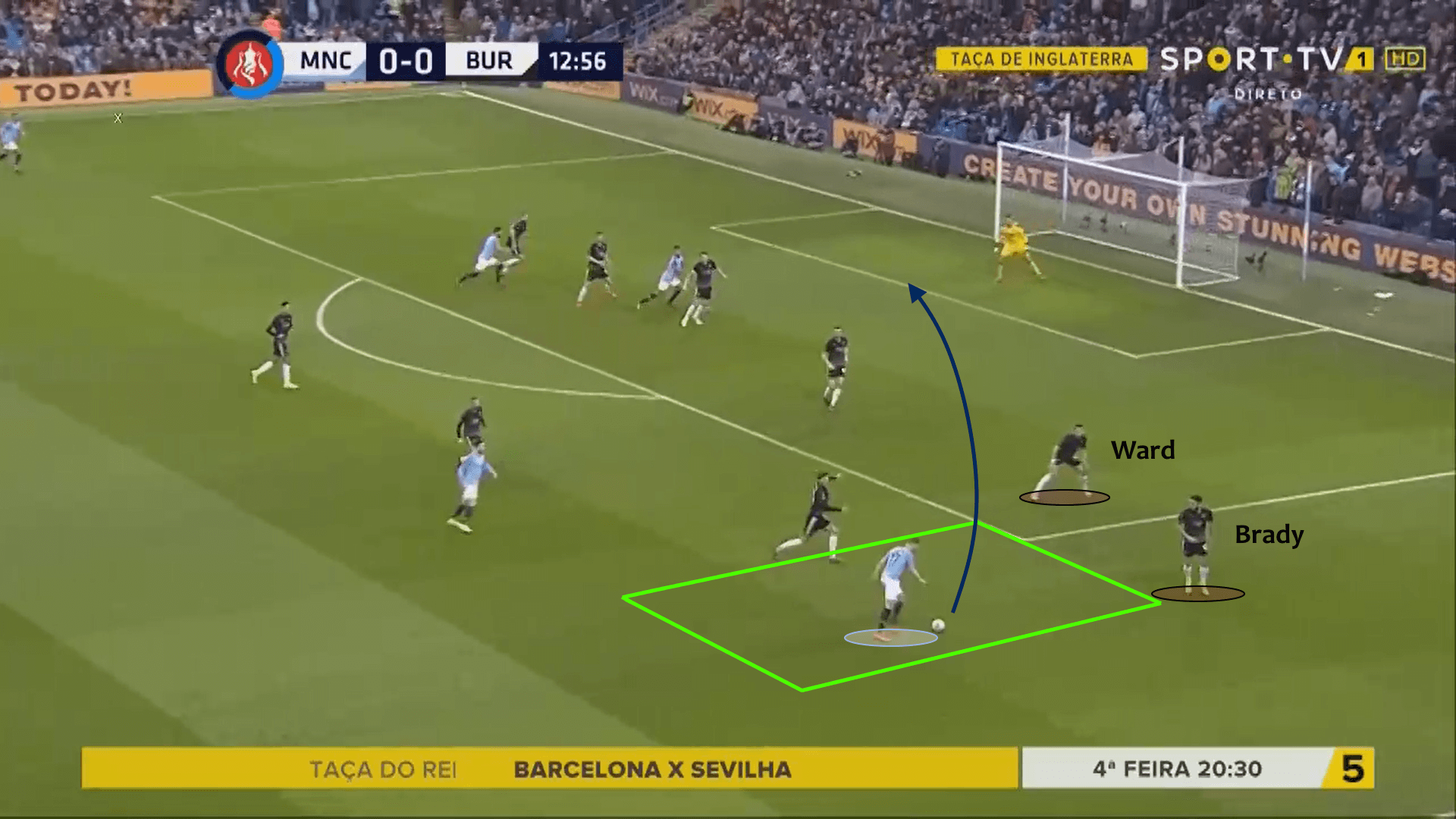
As seen above, Kevin De Bruyne receives a pass and is able to dribble all the way to the box’s corner without resistance. Jeff Hendrick is slow to close down, while Brady and Stephen Ward are too preoccupied with preventing a wide pass or entry into the box. The Belgian comfortably sent in a dangerous cross, showing that virtually everywhere is a dangerous area to give City too much space.
Burnley’s typically rock-solid defence is built on the premise of congesting space in the box and blocking shots. Despite blocking the ball six times on Saturday, Burnley were not successful in stopping shots on target (City had 10). One explanation for this is the shots which City took. Eight of City’s 10 shots on target were in the box and, thus, too difficult to block consistently. This would have been a good plan if Burnley had prevented entry into the box, but City were simply too good to stop.
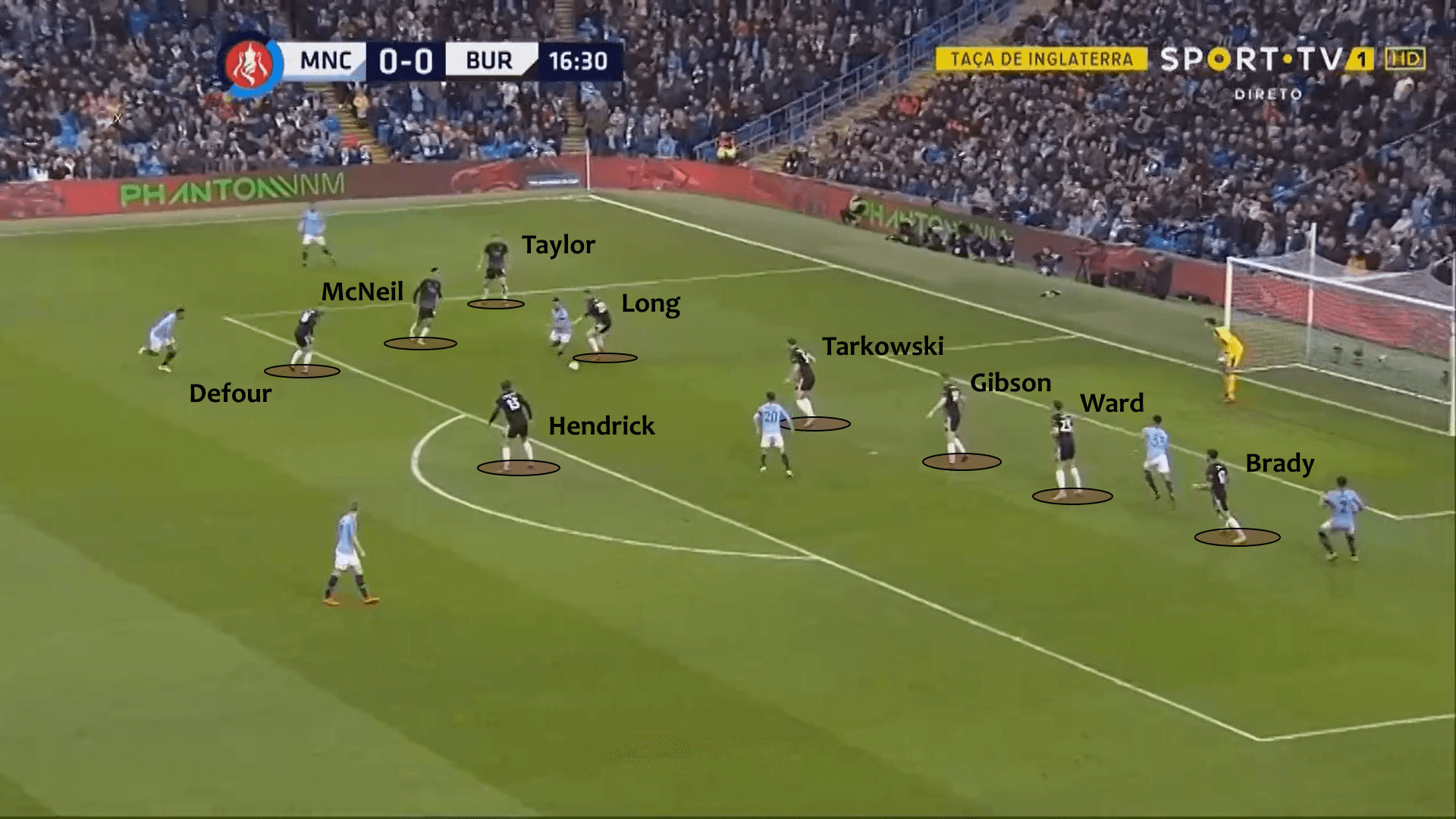
Conclusion
Discussing Burnley’s attacking plan is a moot point. The Clarets failed to get a shot on target on Ederson’s goal, while only mustering four shots in total. Vydra’s chance after intercepting Otamendi’s poor touch could have made it 1-1 and turned the game on its head, but City ran rampant afterwards. Not even the substitution of Wood for Vydra made a huge difference, and City’s Aguero and David Silva came on to seal the victory later.
Burnley supporters may be pleased to be out of the FA Cup, so their players can rest for crucial Premier League ties, but they won’t be pleased with the performance. Both squads were under-manned, but Guardiola and Dyche are two coaches capable of getting the most out of system players. Guardiola did just that, as Danilo, De Bruyne, and Jesus performed exceptionally. Dyche, on the other hand, could not stop the flow of sky-blue attacks long enough to give his side a chance to attack meaningfully.
Manchester City’s ability to move the ball around, combined with Burnley’s ineffectual 5-4-1 defensive system, opened up so much space. As City continue their season and look to usurp Liverpool, they will be happy to know that their blueprint to defeat low blocks is finely tuned and effective. Burnley, on the other hand, will be disappointed to concede five against Manchester City once again.
If you love tactical analysis, then you’ll love the digital magazines from totalfootballanalysis.com – a guaranteed 100+ pages of pure tactical analysis covering topics from the Premier League, Serie A, La Liga, Bundesliga and many, many more. Buy your copy of the January issue for just ₤4.99 here, or even better sign up for a ₤50 annual membership (12 monthly issues plus the annual review) right here.

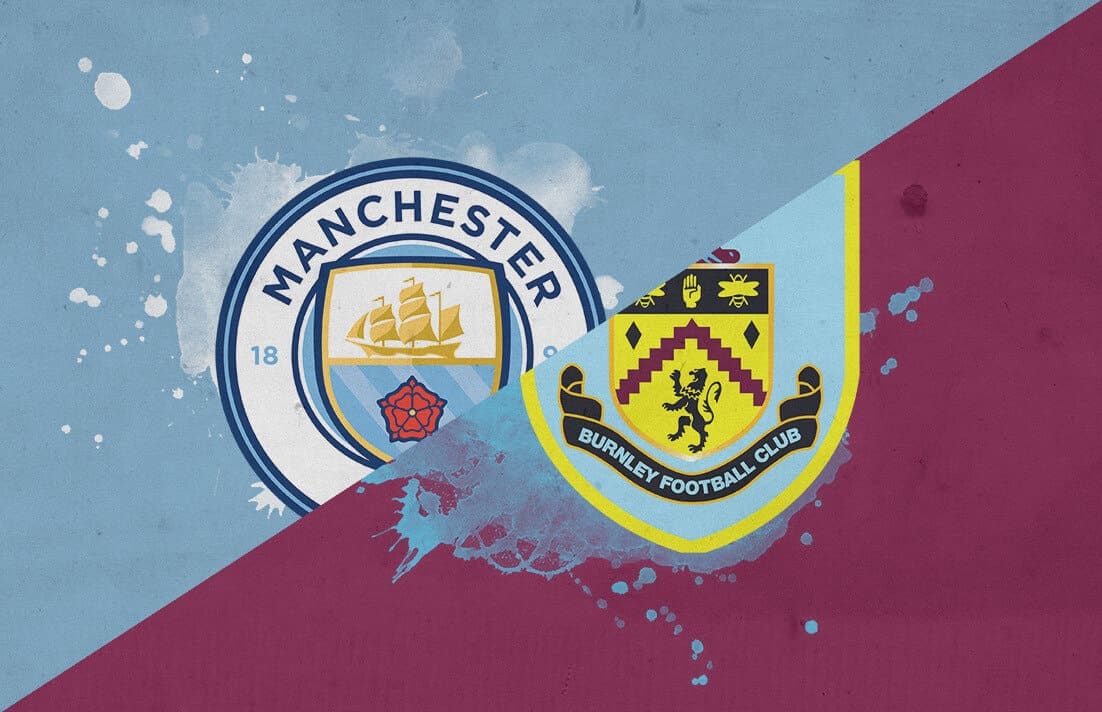



Comments